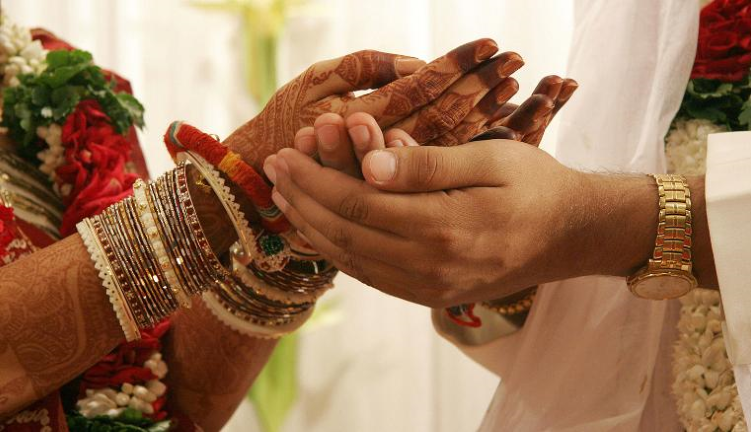Are Unregistered Marriages Valid in India?

Image Source: CNN
The Supreme Court last week held that marriages under the Hindu Marriage Act will not attract any legal status if they are not solemnized according to the rituals prescribed under the law. The court was hearing a petition filed by a woman who sought transfer of her divorce case from Muzaffarpur in Bihar to Jharkhand’s Ranchi. The bench headed by Justice B V Nagarathna stated that merely obtaining a marriage certificate under the Hindu Marriage Act without performing the requisite rituals does not confer the couple the status of ‘husband’ and ‘wife’ and has no legal consequences. The court ruled that the couple who sought divorce need not file any case and take divorce because they are not married in the first place.
What is the solemnization of marriage? Marriage solemnization refers to the performing of the official rituals and ceremonies. In India, the institution of marriage is governed by various laws, including the Hindu Marriage Act, Muslim Personal laws, Special Marriage Act, etc. Each religion governs marriage through certain sets of ‘requirements’, and a marriage is considered valid when these set requirements are met. The concept of marriage under the Hindu Marriage Act is governed by certain rituals. Rituals such as ‘Kanyadaan’ and ‘saptapadi’ (saat phere) solemnize a Hindu marriage. Under section 7 of the Hindu Marriage Act, these rituals and ceremonies are codified, and saptapadi is considered an essential ritual. The marriage ceremony in Muslims requires the consent of both sides, in writing, and in the presence of witnesses. In Muslim marriage, both parties give their vocal consent and sign the ‘Nikahnama’ (an Islamic marriage contract) in the presence of witnesses and a ‘Qazi’.
What are registered marriages? ‘Court marriage’ or ‘registered marriage’ refers to a non-religious or civil marriage under the Special Marriage Act. A marriage performed under this law is essentially solemnized in court without any ritual. A marriage without any ritual is only valid under the Special Marriage Act. Whereas, marriages governed under personal laws such as the Hindu Marriage Act are considered valid only after they are solemnized by performing the required rituals prescribed by the religion. Section 8 of the Hindu Marriage Act confers the state with the powers to register the solemnized marriage as per the requirements of section 7. In Muslim marriage, the Nikahnama issued by the Qazi outlines the terms of marriage. Although not a public registration under a statute, this registration form is widely adopted. Apart from this, several states have their own laws for the registration of Muslim marriages and divorce.
What if a marriage is not registered? The states in India have their own statutes in relation to marriage. In some states, for instance, Karnataka and Delhi, registration of a marriage is mandatory. Registration of marriage becomes useful for varied official purposes. Though not registering a marriage does not declare it invalid, as registration of marriage does not make it valid. When the validity of a marriage is brought under scrutiny, then furnishing a marriage certificate alone cannot be considered proof of marriage. An exception occurs only in the case of marriages performed under the Special Marriage Act. Furnishing a marriage certificate under the Special Marriage Act is proof of the validity of marriage. “On a certificate being entered in the Marriage Certificate Book by the Marriage officer, the Certificate shall be deemed to be conclusive evidence of the fact that a marriage under this Act has been solemnized and that all formalities respecting the signatures of witnesses have been complied with,” the section 13(2) of the Special Marriage Act reads. In Muslim marriages, registration of the marriage is done forthwith after the solemnization is performed, whereas in a Hindu marriage, a priest performing the marriage does not routinely certify the marriage. A valid solemnized marriage might work in determining the question of who is a rightful spouse when there are claims by multiple cohabiting partners. A marriage certificate can act as valuable proof of the validity of marriage but solely cannot be counted as evidence in itself.
Team Profile

- News Writer
- Mohit Dalal, a graduate in Psychology currently pursuing a Master's degree in Journalism, is deeply intrigued by society and its norms. His interest in this captivating field has inspired a desire to excel in legal journalism. Mohit aspires to make significant contributions to the field of journalism, particularly in covering legal issues and related societal matters.
Latest entries
 English10 May 2024Sign of Relief to AAP as Supreme Court Grants Interim Bail to Kejriwal Till June 1
English10 May 2024Sign of Relief to AAP as Supreme Court Grants Interim Bail to Kejriwal Till June 1 English10 May 2024Letter to PM and Rahul Seeks Public Debate Between the Two
English10 May 2024Letter to PM and Rahul Seeks Public Debate Between the Two English9 May 2024Are Unregistered Marriages Valid in India?
English9 May 2024Are Unregistered Marriages Valid in India? English8 May 2024Top Court Hits Pay Dirt and Aspires Towards an Inclusive Society
English8 May 2024Top Court Hits Pay Dirt and Aspires Towards an Inclusive Society





